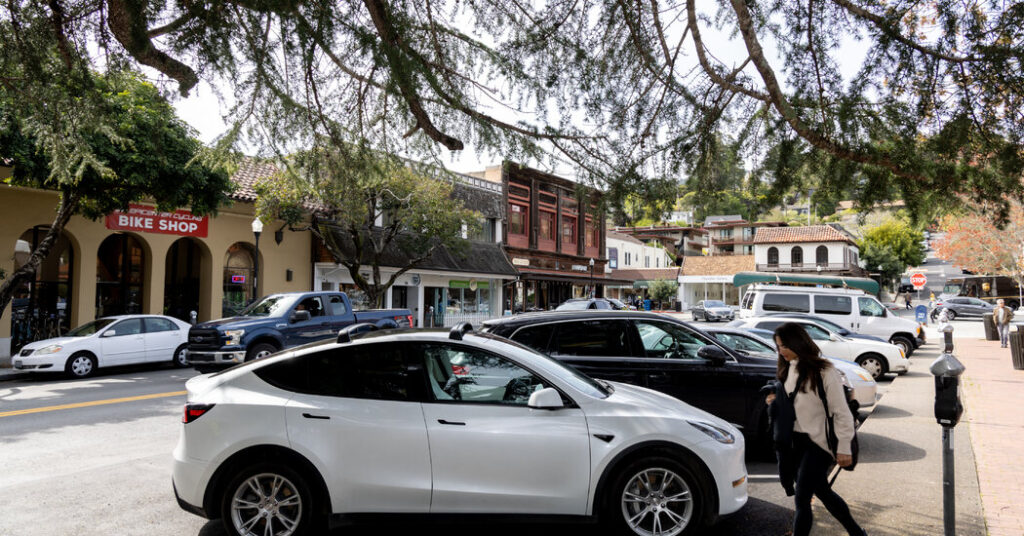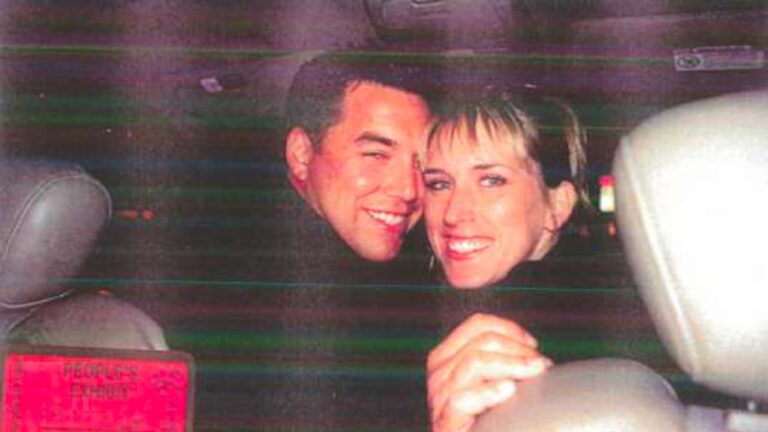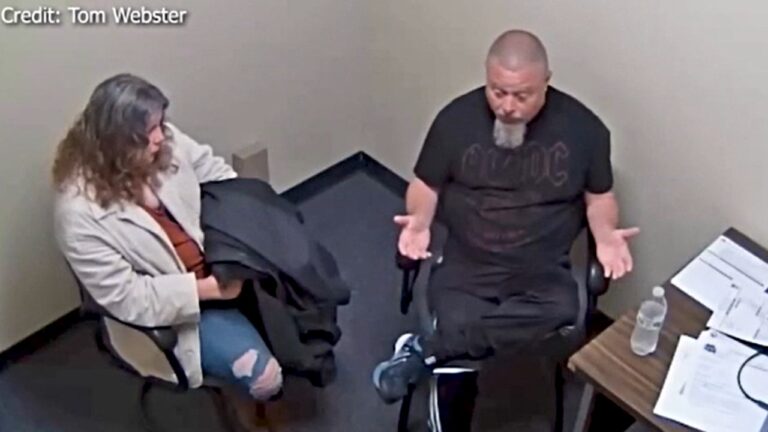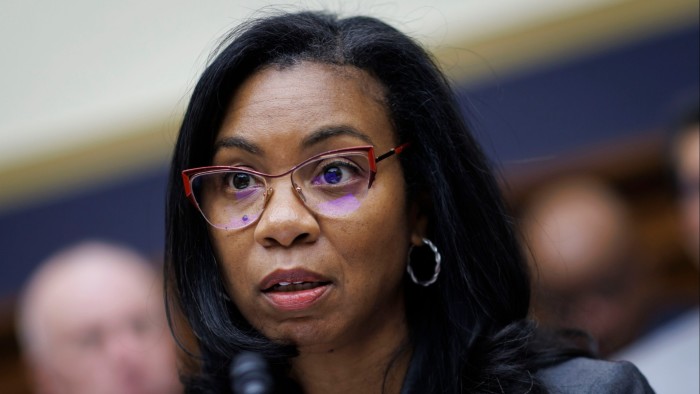
In the parking lots of Mill Valley, Calif., mysterious index cards have surfaced on the windshields of Tesla Model Xs and Model 3s.
“Stop Elon,” they urge in teal script. “Dump your Tesla.”
A few years ago, buying a Tesla in Mill Valley meant that you had money, but were not overly showy. It meant you were a progressive environmentalist who had style.
It meant you belonged.
Ten miles north of the Golden Gate Bridge, tucked into the lush, green hills of Marin County, Mill Valley is an idyllic place to live — for those who are wealthy and liberal.
And for years, Teslas were “the Ferrari for the Patagonia-wearing crowd,” said Nathan Ballard, a political consultant who lives in Mill Valley and owns a black Tesla Model S.
But the sleek electric cars have come to mean something else entirely for Mill Valley residents since the presidential election.
Activists elsewhere have set fire to Tesla charging stations, scrawled swastikas into Tesla vehicles and sprayed graffiti on dealerships. The battle raging in Mill Valley is something quieter: an internal war within the minds and hearts of Tesla owners, their environmental ethos clashing with their rage toward Elon Musk, Tesla’s chief executive.
California drivers own far more electric vehicles per capita than residents in any other state. And Marin County has more Teslas than anywhere but Silicon Valley, according to data from the state’s energy commission.
But Marin County is far more liberal than the Silicon Valley. In last year’s presidential election, 81 percent of voters in Marin supported Kamala Harris, compared to just 17 percent for Donald J. Trump.
In Mill Valley, a rather unexceptional house can cost $2 million, and life is good for those who can afford it. The Mediterranean climate keeps the weather reliably pleasant. Simple pleasures include surfing at Stinson Beach, mountain biking down the trails of Mount Tamalpais or eating a Happy Hippie arugula salad under the redwoods at The Depot Cafe and Bookstore.
Despite its wealth, Mill Valley retains a splash of its tie-dyed roots. Bob Weir, the former guitarist for the Grateful Dead, still co-owns a concert venue here called Sweetwater Music Hall, which features blues sessions and an upcoming Bob Marley tribute.
But the country’s strife has disturbed the vibe even in blissed-out Mill Valley. The town is full of Tesla owners and Tesla haters — and they are often one and the same person.
“We are the P.C. liberals, you know?” said Vikki Goldman, who resents her Tesla but does not want to pay to break her lease. “What are we going to do?”
Residents haven’t been afraid to express strong opinions. Some who despise Mr. Musk regularly protest on the freeway overpass between Mill Valley and the closest Tesla dealership. Seniors for Peace has added Tesla to its list of grievances during the group’s Friday protests outside an assisted living center.
And lately, those index cards have cropped up, including one on Ms. Goldman’s charcoal Tesla Model Y. She found it surprising, considering she had already put a sticker with the word “Elon” crossed out in red on her car. It was an indication of how she felt and, she figured, a way to inoculate herself from scorn. Plus, she said, it helps her find her Tesla in a sea of other charcoal Teslas in parking lots.
Last fall, Ms. Goldman hosted a local event to raise money for Ms. Harris in her backyard. Musicians played to an audience of loyal Democrats, along with several ducks.
Ms. Goldman is the author of “What To Do When You’re Dating a Jew,” which includes everything from matzo ball recipes to the meanings of Yiddish terms. She considers Mr. Musk “a Nazi,” she said, for his support for Germany’s far-right party and for his stiff arm salutes during one of Mr. Trump’s inaugural parties. (Mr. Musk has disputed his arm gesture was a Nazi salute, calling the accusation “dirty tricks.”)
“We could have just as easily gotten a Hyundai,” Ms. Goldman said. “I feel like a jerk.”
Others share the sentiment.
Terry Ross, a retired lawyer, has lived in Mill Valley for 54 years and said he loves that it has retained its character. He bought his red Model 3 in 2022 for about $64,000, but said that he put his car up for sale after he saw Mr. Musk give that salute. Six days later, a used car company hauled it away.
He received $28,000.
“Bottom line,” Mr. Ross said, “I had to get rid of that thing as soon as I could.”
Tesla, the White House and Mr. Musk did not respond to requests for comment.
Carter Zinn, a Mill Valley-based lawyer, leased his Tesla two years ago and recently thought about driving it to the dealership and setting it on fire because he found Mr. Musk’s politics so loathsome. But after thinking more about it, he decided that Mr. Musk had done more good than harm. Mr. Zinn said he admired Tesla’s innovation with electric vehicles and battery storage for solar energy.
Plus, he said, the cars are just plain fast and fun to drive.
“You can make a legitimate argument that he has done more to save the world than anyone else on the planet right now,” Mr. Zinn said, adding, “They’re a tremendous product, and they’re a great value.”
John Turnacliff, a Mill Valley resident who heads the Marin County Republican Central Committee, finds it all amusing. Especially the fact that anti-Musk bumper stickers have become the latest local trend.
“I do smile when I see those,” said Mr. Turnacliff, who drives a Mercedes with a Trump bumper sticker. “They don’t want to sell the cars, but they want to make some kind of statement.”
The index cards recently caused a public stir when one Tesla owner expressed frustration on social media at receiving one of the shaming notes. He said he had photos of the postcard vigilante that had been taken by his Tesla’s camera, but did not post them.
Ms. Goldman was likewise stumped by the card on her windshield. Her husband, however, solved the mystery.
He spotted a woman carrying a thick handful of notecards: their neighbor and good friend, Debbie Coller.
Ms. Coller, 75, quickly confessed to being the index card marauder of Mill Valley. She has lost count of how many she has deposited, but she is on her third Sharpie.
“Teal, purple and now blue,” she noted.
Ms. Coller, a Democrat who was once a Green Party member, said she admired Senator Bernie Sanders of Vermont. She protested the Vietnam War in college and has participated in several demonstrations against Mr. Trump.
She retired from the natural foods business and lives with her husband, a guitarist in five local bluegrass bands. She said she was inspired by Sheryl Crow, the famed singer who sold her Tesla and donated the proceeds to NPR.
“I’ve got to do something, and this is what I can do,” Ms. Coller explained.
She is concerned, she said, that Mr. Musk’s federal cuts would jeopardize the Social Security checks and Medicare coverage that she and her husband rely upon. Mr. Musk has said he was focused on finding fraud in entitlement programs and called Social Security “the biggest Ponzi scheme of all time,” though Mr. Trump has denied he would cut benefits.
On a recent afternoon, Ms. Coller took a stack of her cards to a nearby shopping mall. There, she found plenty of Teslas to target, sometimes parked side by side. She moved sneakily, as if worried about being caught.
Ms. Coller, who drives a Prius, said she thinks Tesla owners should sell their cars and donate the funds to charities, abandon them at Tesla dealerships or at least put anti-Musk stickers on their bumpers.
But many Tesla owners in Mill Valley are averse to taking a financial hit. Local used car sites show a flood of Teslas for sale in Marin County well below $35,000. The automaker this week said that its profit fell 71 percent in the first three months of the year, and the company referred to the potential impact of “changing political sentiment” on demand.
Heather Barberie, who bought a white Tesla Model X in 2020, said she is currently unemployed as an actor and cannot afford to sell.
“If I had the finances that we could just take our Tesla out to the desert and blow it up and have a little bonfire around it, sure,” she said. “But we need our car, and we’re not able to replace it right now.”
Instead, she came up with an interim solution.
She unscrewed the “T” logo from the front, hoping that it made the vehicle a little less conspicuous. She now keeps the metal symbol in her junk drawer.
Sheelagh McNeill contributed research.





